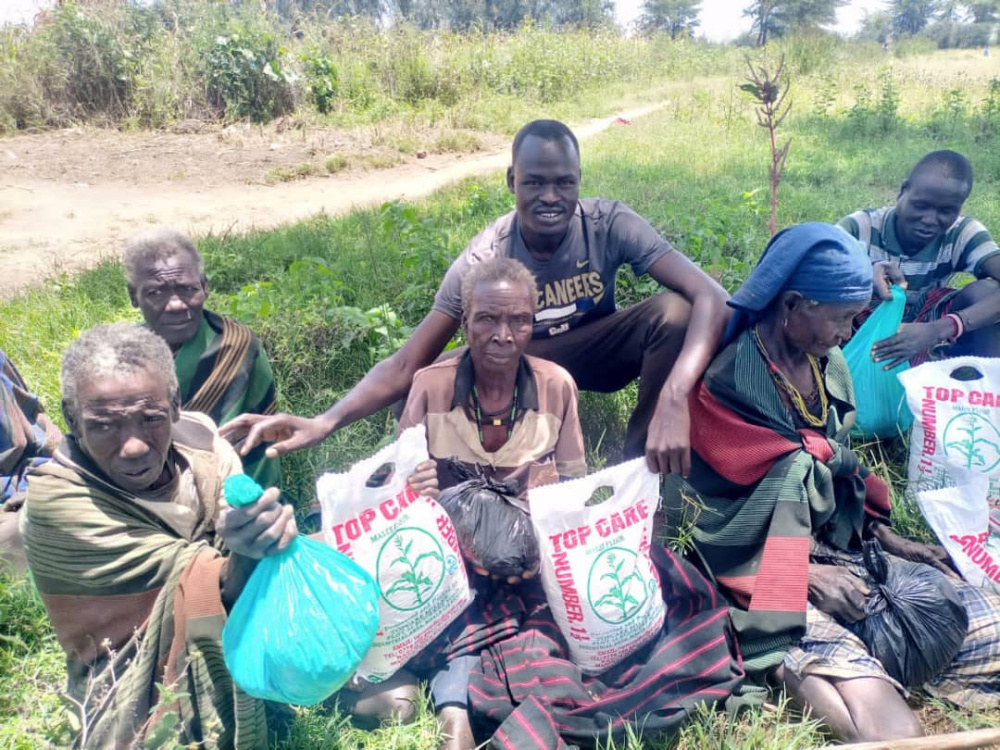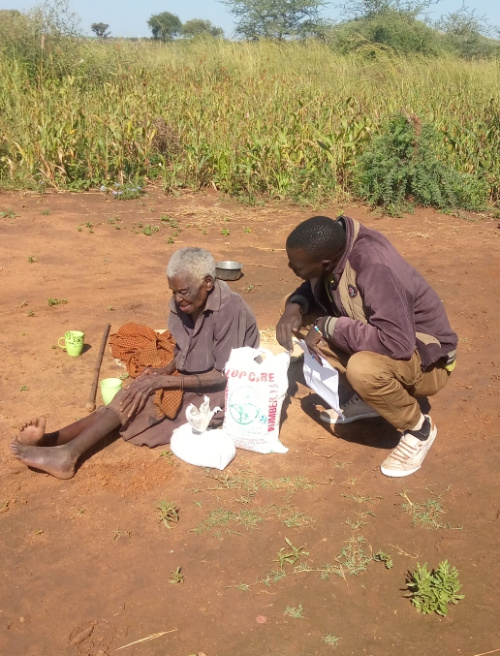Kampala, Uganda
The Anglican Church of Uganda is mobilising food items and cash for thousands of people facing starvation in north-eastern Uganda.
All the nine districts of the Karamoja sub-region – located in the country’s north-east between Kenya and South Sudan – are facing serious hunger with almost half a million people going hungry, according to reports. It’s also been reported that hunger-related diseases have killed 900 residents so far this year while more than 91,000 children are at the risk of death unless immediate action is taken to fight the food crisis.

Food relief provided in the Karamoja region, Uganda. PICTURE: Courtesy of Feed Karamoja Initiative.
In a statement issued by the Anglican Church, Archbishop Stephen Kaziimba Mugalu, recently appealed for food support for Karamoja and other regions facing hunger in Uganda.
“Jesus Christ taught us to feed the hungry and reach out to the needy and that’s exactly what we should do for our brothers and sisters in Karamoja and other regions affected by hunger and other disasters.”
Among the humanitarian agencies and NGOs that have donated food items to Karamoja is Action for Churches Together (ACT) Alliance, a global Protestant and Orthodox Church organisation, that early last month donated food worth 381 million Ugandan shillings (about $US100,000) to feed Karamoja.
Kaziimba said the donation will benefit more than 2,000 families in Karamoja.
Indigenous healthcare workers have also been contributing food items through Feed Karamoja Initiative.

Food relief provided in the Karamoja region, Uganda. PICTURE: Courtesy of Feed Karamoja Initiative.
“It has been quite a challenge to mobilise food for the region because we contribute money from our pockets to buy it,” said initiative member Dr Mark Logiel.
Logiel said the region needs longer-term support to address the root causes of the problems in the region.
“The challenge of food shortage in Karamoja has been brought about by lack of empowerment and environmental fluctuations,” he said. “The region needs to be supported with tractors, seeds, fertilisers and small-scale irrigation schemes to overcome its current situation.”
Alex Taremwa, co-founder of non-profit media organisation Last Drop Africa – which has also launched a food relief campaign with the aim of raising 100 million Ugandan shillings (about $US25,950) by 31st December, agreed more long-term, sustainable solutions are needed to address the crisis.
“We know that we cannot fundraise for every climate crisis because while you are still in Karamoja, rivers are bursting banks in Kasese, floods are washing away homes in Mbale, and land is burying people alive in Bududa,” Taremwa said. “But for the long long-term solutions to be of value, people must be alive to enjoy them. That is what we are trying to do here.”
Other organisations providing food aid in the region include World Vision, Save the Children and Uganda Christian University which has contributed 4.5 million Ugandan shillings (about $US1,170) to support Karamoja.
“Being your neighbour’s keeper means that when someone is suffering, for example, due to lack of food in Karamoja, you have to do something for them,” said UCU’s chaplain, Rev Eng Paul Wasswa Ssembiro, who led the campaign to mobilise food support.
We rely on our readers to fund Sight's work - become a financial supporter today!
For more information, head to our Subscriber's page.
Rev Fr Joseph Ogwal, who has been working with the vulnerable people in Karamoja region, told Sight that the problem of hunger in the region has been mounting for years.
“If you go deep in the villages, you can really witness the situation by yourself,” said Ogwal. “One would get speechless when he witnesses the real-life story in Karamoja.”
He attributed the hunger in the region to climate change that he said had made it extremely hard for the locals to predict the planting season as well as insecurity in some districts and a reduction World Food Program support in the region.
“Over the years, WFP has been reducing the volume of food handouts that they have been giving out to people in Karamoja,” Ogwal said. “They have instead resorted to another strategy of using NGOs to give seeds to people such that they can plant, but now that the weather is unfavourable, food has become a serious challenge.”
The food crisis in Karamoja highlights the challenge Uganda is facing in eradicting hunger.
In July, Ugandan Government dispatched 552 tons of maize flour and 238 tons of beans to the region to support the starving population. Prime Minister Robinah Nabbanja has also appealed to Western donors and development partners to respond to the prevailing food insecurity in Karamoja sub-region.
The correspondent, John Semakula, is an independent journalist and a lecturer at Uganda Christian University.
Correction: The location of the images has been corrected to Uganda.






